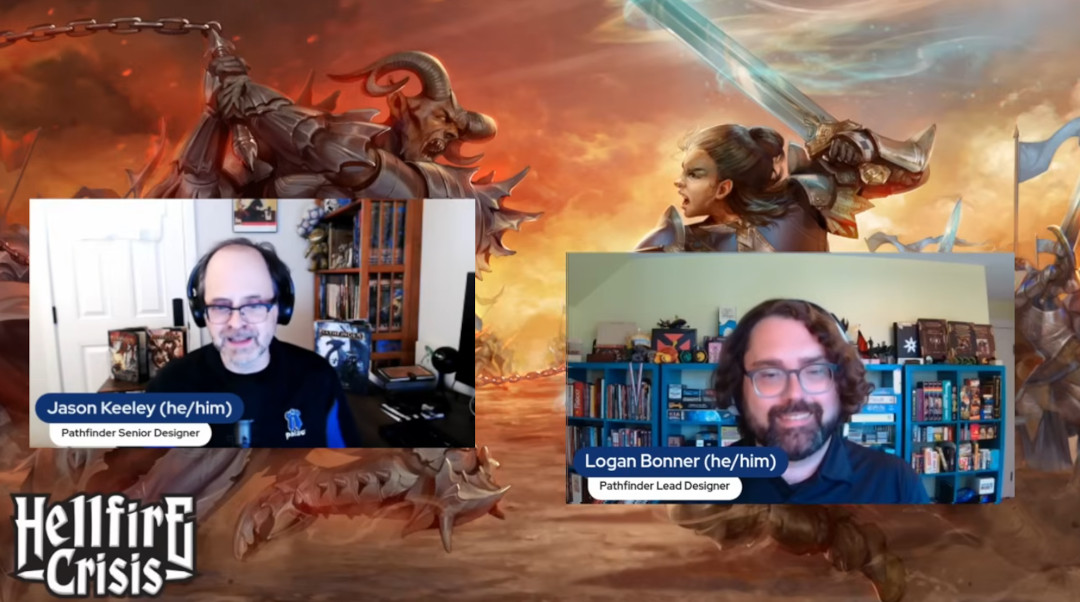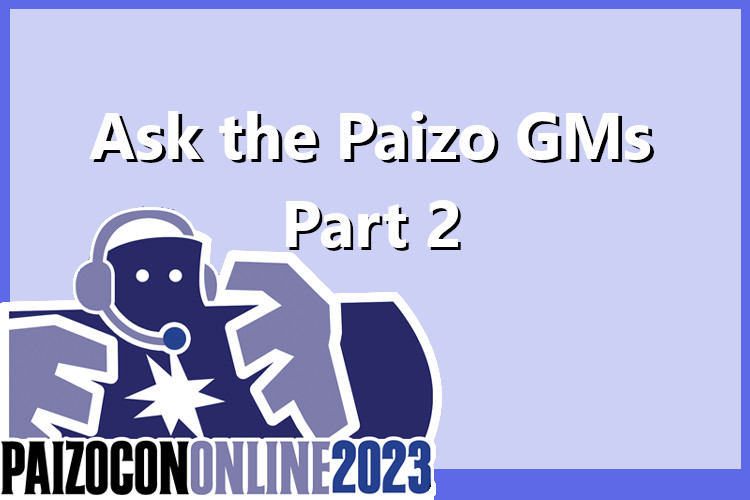We speak with Mike Selinker and Tanis O’Connor about the Pathfinder Adventure Card Game? Also: Our review of the Advanced Class Guide!
Interview: Adventure Card Game
- We are joined by the creator of the Adventure Card Game and President at Lone Shark Games, Mike Selinker, as well as one of Paizo’s newest employees, Pathfinder ACG Designer Tanis O’Connor. By the way, many of our questions were provided by or aggregated by Know Direction’s Adventure Card Game correspondent Sarah Bull. http://paizo.com/pathfinder/adventureCardGame
News & Banter
- Here is a game room!
- New Iconic Sets from Wiz-Kids – BADGER INCLUDED!
http://paizo.com/paizo/blog/v5748dyo5lght?Pathfinder-Battles-Preview-Iconics-Rise-Again
Read Magic
- Advanced Class Guide Mega Discussion!
Wrap Up and Shout Outs
- Bundle of Holding
http://bundleofholding.com/index/current - Saying goodbye to a sponsor. Café Chimera Games closes down.
Podcast: Play in new window | Download






In response to Ryan’s displeasure with the specific nature of the prereqs in the ACG, while I cant speak for every single feat and its prereqs, as a concept, I seriously agree with the idea of making feats specific to a particularly class or focused concept.
The reason I feel this way is the same reason I feel the best way to add options to the game is through base classes. Focused design leaves less room for exploit and more room for interesting ways to help a specific idea work better.
Lets take a hypothetical feat or chain of feats designed to help something like the swashbuckler shine. The swashbuckler is primarily intended to fight with a onehanded weapon and nothing else. This is the least effective combat style (as opposed to fighting with 2handed weapons, two weapons, or even sword and board). So, in theory, feats/options that expand this fighting style need to be stronger then feats that expand other fighting styles if you want to make the concept as a whole appealing. BUT there is another class that fights one-handed that doesnt need such help. The magus. He fights with one one-handed weapon as part of spell combat, but he’s casting a spell with the other hand, which more then makes up for the limitations of the one handed combat style. He needs no additional help.
If you made feats that made the swashbucklers onehanded combat able to compete with other combat styles and you left the prereqs relatively open, the already capable magus could take it and gain a boost it doesnt need.
This is what I mean by focused design, by restricting what kinds of characters can take it, you dont have to work on unforseen consequences of mixing and matching different options. You can make something powerful so long as it is made to work only with something relatively weak. Where as if you leave it more open, you either have to make the feat/option more lack luster so it doesnt boost the already capable concepts, or risk exploitation by people just looking for an edge.
Obviously this isnt the case for all the feats with significant prereqs in the ACG, but in general I approve of the idea. The more isolated an option is, the less problematic it will be. For instance one of the most discussed Feats in the ACG, Divine Protection, is open to almost every divine caster class. If it was say, only available to warpriests, it probably wouldnt have been an issue. Most people worry about it with regard to oracles, who by their nature already have a high charisma. With the rest of the divine casters, who use wisdom to cast and are usually trying to fight also, they arent going to have the super high charisma. So while it is a way to make the often ignored charisma a more useful stat for the clerics, druids, warpriests, and inquisitors, and would provide a relatively small bonus to saves. For oracles, charisma is already their key stat, and it provides a large bonus to saves.
The more isolated prereqs for options are, the less problematic they will be in the long run, and the easier they are to playtest, and to design.
My objection is twofold:
1. As the art illustrates when they chose the iconic magus using a feat that has class-specific prerequisites that don’t include the magus, it narrows who can take the feat down even if other classes look good or make sense using it. And considering the ACG’s big draw was classes that make sense when you blend two concepts together, I found it particularly strange that so many feats were designed with the idea that you can’t just take a concept meant for one type of build and use it for another.
2. It mostly just increases the gap between build players and RP players.
In my group, there are players who have their character’s entire progression written out from level 1, there are players who have a level or two planned or an or two that they have approximate plans to get, and there are people who have no idea what choices they’re making the next level. That’s in order of expected power level.
Super specific prerequisites only slightly deter the players who are already good at planning out a character. They have to weigh whether the juice is worth the squeeze a bit more, but that skill is their strength as character builders. It also leads to level dipping to get the feats that match the build goal, even if that means multiclassing that sounds odd. Take someone who wanted a magus with that feat that lets him pick up dropped weapons. If their vision is a character who doesn’t carry a weapon but uses grease to disarm opponents then kick their weapon into their hand, they’re forced to take a level of swashbuckler that doesn’t fit the theme of their build to accomplish the the theme of their build.
Meanwhile, the players who only plan a bit in advance or not at all are left hoping they luck out and qualify for the feats that look interesting, or build characters in ways that they don’t enjoy or don’t come naturally to them.